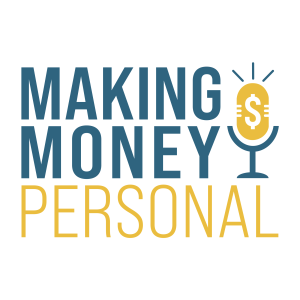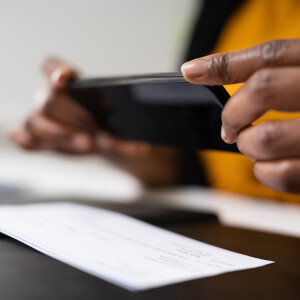Episodes

Tuesday Nov 28, 2023
Five Holiday Scams to Avoid - Money Tip Tuesday
Tuesday Nov 28, 2023
Tuesday Nov 28, 2023
If your holiday shopping is in full swing, your head is probably buzzing with all the to dos and events filling up your schedule. But, during this time it’s also important you keep your guard up because fraud can lurk behind even the cheeriest holiday ad or email.
Links:
Check out other common holiday fraud tactics
Learn more about ID Protect with Triangle's Better Checking
Check out TCU University for more financial education tips and resources!
Follow us on Facebook, Instagram and Twitter!
Learn more about Triangle Credit Union
Transcript:
Welcome to Money Tip Tuesday from the Making Money Personal podcast.
Holidays are a busy time for most of us. We’re wrapped up in the excitement of gift giving, shopping, hosting, prepping, there’s just so much to keep in mind when you’re maximizing your holiday experience.
While we’re shopping for the perfect gift, hanging up the Christmas lights or baking cookies for the fam, someone else is busy this time of year, and they’re not filling out cards or sending letters to Santa. They’re fraudsters and they’re trying to steal your money.
Fraud increases significantly during the holiday season and its prevalence should make you pause before opening that incredible new deal that just popped up in your inbox.
You’re probably thinking, oh come on, one more thing to have to worry about this season? Yes! When it comes to keeping your identity safe, you can never be too busy.
Don’t let the thieves rob you of your holiday cheer this year. Here are a few of the more popular fraud tactics you should keep in mind while celebrating the holiday season.
Fake Charities – What better time to prey on the generosity of people than during the holiday season? Bad actors abound and you can bet they’ll try preying on your generosity by posing as a charity to get you to hand over a donation, no matter the amount. When giving to charities, stick with the ones you trust. Visit their site directly to make your donation instead of clicking on a link.
Lookalike online stores – These are common on social media and can be extremely convincing. Fraudsters put together a fake website and then create attractive ads that promote incredible deals to get you to click. They post those ads on social media and link back to their site where you select your item and can even complete a purchase. Oftentimes, people who fall for this find out it’s a scam when they never receive their item. Be careful when you see sites offering great deals. Even if it looks legit or appears to be a brand you recognize, check the URL to verify it’s the actual brand’s site, and always make sure to check the website for contact information and a return policy. If they don’t have either, then it's a huge red flag the site is fraudulent.
Phishing scam emails – If you’re like me, your email inbox is overflowing with deals, offers and other holiday specials. But, where the emails abound, fraudsters are likely to be present. Keep a close eye on the emails you receive and beware of deceptive ones camouflaged to look like reputable sites. Keep a sharp eye out for urgent messages, spelling or grammar errors and other red flags. Hover over all URLs before clicking to make sure they link back to the brand site and don’t open any attachments or click any links before making sure they’re legitimate.
Fake tickets for travel or other events. Who doesn’t want to save on their next big vacation or favorite star’s uber expensive music tour. If you’re a travel or experience aficionado, you’re likely to be watching for discounts and offers for traveling or other experiences. But beware because this is another way scammers try to trick you. You may see offers for deeply discounted travel or concert deals through email or social media. They can also come as fake sweepstakes where you’re notified that you won an all-expenses paid trip to the destination of your dreams or a free cruise to a tropical paradise, but you don’t remember entering. Again, think twice before clicking on unbelievable travel deals or notices. Work through companies and websites you trust to avoid falling for one of these scams.
Missed delivery notifications – This tactic tries to trick you into clicking a link via a text message. Scammers send you a text message appearing to be one of the nationally recognized delivery companies, informing you of a missed delivery or a delivery update. Since we’re all likely waiting on deliveries this time of year, receiving a message like this might not seem so suspicious. Once you click the link, you’re brought to a fake website where you’re prompted to provide sensitive information like a credit card or SSN to retrieve your order update. If you get a message like this, don’t click the link. Delivery companies won’t ask you to provide a credit card number or social to look up delivery information. Visit the company’s website directly to track your order, get updates or to contact them.
Those were just five examples of common holiday scams, but there are so much more. Check the link in the show notes for a longer list of other fraud tactics that occur around the holiday season.
Before I close I want to remind you of these best practices to safeguard yourself from fraud not only this time of year, but all year round.
Be very wary of any urgent message prompting you to act now
If it looks too good to be true, it probably is
If you get a phone call from a FI or other company you do business with asking for sensitive information, hang up and call them at the number on their website
Make sure you have identity protection and fraud monitoring to help with resolution. There are a lot of affordable options out there that give you a great benefit for a reasonable price, like Triangle’s Better Checking with ID protection. If you’re interested, visit a branch or check the website to learn more.
The holiday season is supposed to be full of comfort and joy. And though I don’t want to bring you bad tidings or negative vibes, I want to keep you informed so you can enjoy your celebrations in peace.
Stay safe and enjoy a fraud-free holiday!
If there are any other tips or topics, you’d like us to cover, let us know at tcupodcast@trianglecu.org. Like and follow our Making Money Personal FB and IG page and look for our sponsor, Triangle Credit Union on social media to share your thoughts.
Thanks for listening to today’s Money Tip Tuesday and be sure to check out our other tips and episodes on the Making Money Personal podcast.
Have a great day!

Tuesday Nov 21, 2023
Countdown to a Successful and Stress-free Thanksgiving - Money Tip Tuesday
Tuesday Nov 21, 2023
Tuesday Nov 21, 2023
Thanksgiving is one of the most popular holidays because it’s not about costumes or presents, it’s about taking time to give thanks and be with family and friends you love. While that is what we would like to think, Thanksgiving has become somewhat of another stressful holiday that can fill you with financial, mental, and emotional anxiety. Stay tuned as we countdown ways you can alter your Thanksgiving feast and family time to make this holiday the best one ever!
Links:
Check out TCU University for more financial education tips and resources!
Follow us on Facebook, Instagram and Twitter!
Learn more about Triangle Credit Union
Transcript:
Welcome to Money Tip Tuesday from the Making Money Personal podcast.
I love Thanksgiving primarily because my mom is a fantastic cook and even though I’ve been adulting for 40 years, she still hosts our family with all the delicious fixins! I won’t say getting to her house for Thanksgiving is the easiest because she and my dad live six hours north of our home in NH. As you can imagine, the most stressful issue for us is getting there! My husband and I have two adult daughters: one with a job and one in college in NC. What was an easy arrangement for us to all get in the car years ago, has now become quite an ordeal. Now we have three people who have to get time off and getting the also have to get our girl home from university without breaking the bank. We know we aren’t alone when it comes to holiday stress so here are ideas you can incorporate into the final countdown to Thanksgiving:
7 Days Out – if you haven’t extended your invites yet, you need to do that today! You don’t need formal invitations or a special email—a phone call or a text will do. When you think about those invitations, really stop to consider who’s going to be at your table. In addition to the who, you also want to consider how many simply because a crowd can cause chaos. Too many people can lead to a hectic and stressful situation so don’t put yourself in that position. Invite those who can comfortably fit at your table. And don’t forget the single aunt or neighbor who may not have anyone to share this special day with—extending the invitation will make their day a special one.
6 Days Out – Clean out your fridge and make room for all the groceries you’re about to buy because it’s time to think about your meal: what will you serve for an appetizer, main entrée, sides, and dessert? Once you have the menu, then you’ll want to prepare your grocery shopping list. We all tend to over prepare or buy when it comes to food so be considerate of your budget and don’t go overboard. There are meal planning tools online (and we’ll share those in our show notes). If you are on a budget, don’t be afraid to ask your family and friends to bring a side dish to share. Whenever I get an invitation to a party, I always ask, “what can I bring?” with the expectation that I do need to bring something! Try to stick to your list when you go shopping—if you do buy extra groceries just make sure you can afford them and you have room to store them! You will find grocery stores offer big sales during Thanksgiving week so if your budget allows, plan to pick up a little extra, but don’t go over budget! Check the sales flyers before you leave your house and don’t forget the condiments!
5 Days Out – Plan your table. There is something about a festive table to set the mood. Add some holiday decorations as a centerpiece. If you’re looking for ideas, a simple Pinterest search will present you with some amazing suggestions. Table décor is beautiful and will be appreciated by your guests, but it is not necessary so if your budget doesn’t allow for it, you can pass on this one. I have a co-worker who just told me she will have thirteen people for Thanksgiving which is about the cutoff for real or paper plates. She’s opting for paper and that is a great option as well—super easy clean up and there are gorgeous prints and patterns to choose from in all sizes.
4 Days Out – More planning is on the menu today: what will your day look like and what will your guests be doing? How long do you plan to have them stay? It’s quite common to have guests arrive an hour before mealtime, which is perfect for appetizers and to catch up. After the meal and clean up, what comes next? So glad you asked! Depending upon your vibe, your guests can retreat to the family room and sofa for football, or you can bring out the board games once the dining room table is cleaned. After dinner coffee is always a good idea—a little mid-afternoon caffeine pick-me-up will keep your guests awake! Whatever you plan for entertainment, let it be simple and easy. There is no need to force complicated activities and cause frustration. There is one item that is a must: make sure you take a photo together. Be sure to think ahead about when people will be leaving so you have the time to capture your special day together.
3 Days Out – Start cleaning. Anytime I have guests, I always start my cleaning early. I do try to keep our house tidy but inevitably, there are rooms to clean! Depending on how many rooms you have, tackle one or two a day so you don’t play yourself out before the big day!
2 Days Out – Keep on cleaning! Double check the groceries to make sure you have everything you need. If you have any last-minute items, now’s the time to get them!
1 Day Out – It’s Thanksgiving Eve and your guests arrive tomorrow—no need to panic because the house is looking great (if not, keep cleaning), your groceries are in the pantry and refrigerator! Today is the day to pre-prepare any food that doesn’t have to be made on Thanksgiving Day, which can be most dessert items and apps. You can even set and decorate your table in advance. Once your food items are prepped, put them in the refrigerator for tomorrow. One last item: write a to-do list for tomorrow with approximate timelines—this will help you keep a schedule and limit your anxiety…then get to bed early; you’ve got a big day tomorrow!
Thanksgiving is here and it came up fast, but you’re ready to face it with gusto! Enjoy your special time with those you love and give thanks for it all.
If you have any comments, tips or ideas, please email us at tcupodcast@trianglecu.org. For more great content, be sure to subscribe to the Making Money Personal podcast wherever you listen to podcasts and be sure to follow us on social media.
Many thanks to our sponsor, Triangle Credit Union, voted the best credit union in NH, and many thanks for tuning in.
Have a great day everyone!

Thursday Nov 16, 2023
Episode 63: Kickoff with Kevin | Kevin Shepherd
Thursday Nov 16, 2023
Thursday Nov 16, 2023
In this very special episode, we have some great news to share. We're introducing for the very first time a brand new host, Kevin Shepard who just joined our podcast team. In this episode, we're gonna chat with Kevin about what he's excited to share on this podcast and how you can enter a special raffle that we're running to celebrate this occasion.
Links:
Check out TCU University for more financial education tips and resources!
Follow us on Facebook, Instagram and Twitter!
Learn more about Triangle Credit Union
View episode transcript
Kickoff with Kevin Contest!
Join us in celebrating our new podcast host, Kevin Shepherd! We’re welcoming him to our Making Money Personal podcast team and wanted to celebrate this exciting news with you by raffling off some gifts!
To celebrate Kevin, we’re giving away three $50 gift cards to specific businesses selected by Kevin himself.
Entering is easy— Email us at TCUpodcast@trianglecu.org with a welcome message to Kevin along with the gift card of your choice and you’ll be entered*!
Entries will be accepted until Thursday, November 30, 2023.
View official contest rules.

Tuesday Nov 14, 2023
Tips to Keep Your Mobile Wallet Safe - Money Tip Tuesday
Tuesday Nov 14, 2023
Tuesday Nov 14, 2023
In a world of consumer convenience, nothing is easier than using a mobile wallet. If you’re ready to make it easier to buy, stay tuned.
Links:
Check out TCU University for more financial education tips and resources!
Follow us on Facebook, Instagram and Twitter!
Learn more about Triangle Credit Union
Transcript:
Welcome to Money Tip Tuesday from the Making Money Personal podcast.
Mobile Wallet use is on the rise and here is some staggering data. As of July 2023, there were 3.4 billion mobile wallet users in 2022, growing to a projected 5.2 billion in 2026. An estimated 54% of e-commerce payments will be made via mobile wallets by 2026. Almost half (49%) of global online transactions were made with a mobile wallet in 2022.
A mobile wallet is an application on your mobile device that stores credit cards, debit cards, gift cards, and even some event tickets on smartphones and smartwatches.
Mobile wallets allow you to make quick, secure and convenient payments with just a tap on a contactless card reader.
Mobile wallets are more secure than a physical card because when you pay, your phone communicates with the terminal using near-field communication technology which provides encryption and other protections when data is transferred.
Your credit card number is also replaced with a randomly generated digital ID, referred to as a token, which means your card number is not being transferred at the point of payment.
Although the payments from a mobile wallet are safer than a physical card, you still need to take precautions in case your mobile device is lost or stolen.
While mobile wallets are a more secure payment method, there are always some ways to boost the safety of your mobile wallet—here are our tips:
Keep your phone locked. One of the first steps is to enable a lock on your phone with a numerical/alphabetical password, a swipe pattern or biometric authentication. Biometric passwords are the most powerful because they require a fingerprint or face scan to unlock your phone.
If you choose to use a password, use a mix of letters, numbers, and symbols to make it more difficult for a thief to guess. If you choose a swipe combination, always make sure you enter your password confidentially as you can never be too sure who might be watching you.
Make sure the mobile wallet app you are using is from a trusted source. Most new smartphones will come with a mobile wallet app preinstalled on the phone such as Apple Pay, Google Wallet, Samsung Wallet, etc. If your phone does not come with a preinstalled mobile wallet app and you’re interested in using one, make sure you download an app from your phone’s app store that is created by a trusted brand.
Don’t use public WiFi. Public Wi-Fi can be found in most restaurants, retail stores, shopping malls, and more. Although convenient, public WiFi is easy for thieves to hack, making your information easy to obtain. Cybercriminals can track your activity online, get into your accounts and even see payment information.
If your mobile device is lost or stolen, make sure to immediately contact your financial institution and put a hold on your cards and account, just in case.
Taking a few extra steps to ensure the security of your mobile wallet will give you extra peace of mind this holiday shopping season.
If there are any other tips or topics you’d like us to cover, let us know at tcupodcast@trianglecu.org. Like and follow our Facebook and Instagram pages, and look for our sponsor, Triangle Credit Union, on social media to share your thoughts.
Thanks for listening to today’s Money Tip Tuesday, and make sure to check out our other tips and episodes on the Making Money Personal podcast.
Have a great day!

Tuesday Nov 07, 2023
One Simple Way to Save Money on Purchases - Money Tip Tuesday
Tuesday Nov 07, 2023
Tuesday Nov 07, 2023
There are so many tips and tricks out there to save money and maximize purchase power. When inflation is on the rise and we feel like we’re spending more for less, it’s best to explore new ways to save ourselves some money on items we’re planning to purchase already. Luckily, there’s one thing everyone should do to save on purchases.
Links:
Learn more about how to get started with Purchase Rewards
Check out TCU University for more financial education tips and resources!
Follow us on Facebook, Instagram and Twitter!
Learn more about Triangle Credit Union
Transcript:
Welcome to Money Tip Tuesday from the Making Money Personal podcast.
These days more and more people may be cutting back on extra purchases to save money.
If you’re one of them, you’re likely trying to find ways to stretch your dollar.
You may have cut back on frivolous purchases, started making more meals at home, traveling less and shopping the sales or clearance aisles.
But if you’re still feeling the pinch, there’s a money saving method you may have not considered using.
I’m talking about Purchase Reward programs. Purchase rewards programs help you maximize your purchase power by saving you money on anything you buy.
Who wouldn’t want to get a portion of their money back on their purchase? It’s almost like buying stuff on sale.
It doesn’t matter who you are, what you do, or how much money you make; everyone should be using purchase rewards programs.
You may already be thinking, but I’m already getting cash back and with my credit card. That’s a great way to earn on purchases, but most credit card programs just bank points for you to use down the line, while others allow you to use points for cash back or statement credits, but that’s after you’ve purchased your item and redeeming points is dependent on you.
Purchase rewards programs are a little bit different.
These give you cash back automatically on your purchase. Instead of earning points that get banked for later use, which can be forgotten, rewards programs automatically return a portion of your purchase price back to you.
If you’re interested in this easy and automatic money-saving opportunity, don’t look to your credit card or a special promo program, look to your debit card.
Some financial institutions offer Purchase Rewards through your debit card so you can earn money back on purchases made from certain online merchants.
For example, Triangle’s debit card offers a purchase rewards program that provides all kinds of discounts with some going up to 10% back on purchases from certain vendors.
This is phenomenal benefit for anyone working a budget because not only do you save money, the other benefit is that you’re using your debit card, so you’re not racking up a credit card balance that could charge you expensive interest.
If you have a Triangle debit card, it’s easy to set up right through your online or mobile banking,
Just log in, register and within minutes you can explore and activate rewards from vendors within the program.
There are hundreds of offers with vendors spanning categories from clothing, automotive, wine, hotels, food, electronics, restaurants and more.
Once you activate the offer, use your debit card with that vendor and get cash back to save yourself some moolah.
Now's the perfect time; the holidays are ramping up so check out purchase rewards and have fun exploring vendors for your holiday gift planning or maybe even a little something special for yourself.
If there are any other tips or topics, you’d like us to cover, let us know at tcupodcast@trianglecu.org. Like and follow our Making Money Personal FB and IG page and look for our sponsor, Triangle Credit Union on social media to share your thoughts.
Thanks for listening to today’s Money Tip Tuesday and be sure to check out our other tips and episodes on the Making Money Personal podcast.
Have a great day!

Tuesday Oct 31, 2023
Frightening Financial Stats to Avoid - Money Tip Tuesday
Tuesday Oct 31, 2023
Tuesday Oct 31, 2023
It’s Halloween time. The time when many people chat about ghost stories, urban legends and share other spooky tales.
In this tip, we’ll share a few spooky stats of our own--only these are financial.
Links:
Check out more frightening financial stats from Forbes.
Open a savings account to start building your emergency fund
Learn more about Triangle's wealth management solutions
Check out our Financial Freedom: Your Path to Debt Free Living webinar
Check out TCU University for more financial education tips and resources!
Follow us on Facebook, Instagram and Twitter!
Learn more about Triangle Credit Union
Transcript:
Welcome to Money Tip Tuesday from the Making Money Personal podcast.
With a little Internet searching you can find all kinds of stats on the financial situations current Americans find themselves in.
Some of these stats are positive, while others are a little more negative, even frightening for some.
Being in good financial shape is paramount to living a life where you don’t have to be haunted by debt or frightened by unexpected expenses.
In this tip we’ll share a few frightening financial facts out there that many Americans are facing right now but will share some suggested solutions because the good news is that with the right planning, these can be avoided.
Frightening fact #1 – 56% of Americans can’t afford a $1000 expense.
If you’re in this situation, things can get scary if an expense pops up that you’re not expecting. It could be a spontaneous car issue, a broken phone, a sudden medical bill, or immediate home repair.
This can be frightening because the panic and distress of an unexpected situation can be compounded by the stress of not having the money to cover the cost.
Don’t let one of these almost inevitable situations derail your financially. You can avoid this freaky financial situation by making sure you set up an emergency fund.
It doesn’t have to be a lot initially. You just need to set up a buffer so in case something unexpected happens, you can cover a portion or all of it without freaking out.
Try to save $500 or even $1,000 to begin. Having that money available for emergencies will make a world of a difference in how you’ll face your next emergency - with either peace or panic.
Frightening Fact #2 – Roughly 37% of Americans haven’t done any retirement planning.
The reason this can be frightening is because to maximize your retirement savings you need to have a plan, and the earlier you plan, the more you’ll have. If you don’t have a plan at all you run the risk of missing critical years to build up retirement savings and may not have enough to retire by the time you reach that age.
Planning for retirement is a critical action to take if you dream of not having to work one day but it can be confusing or intimidating on how to start.
This is where working with a financial advisor or planner can be critical.
They will help you determine how much you will need in retirement, how much you will need to save now to reach that goal and can help you adjust your plan as you age or life changes.
If you’re ready to get started, Triangle has wealth management services to help you no matter what your age or how much money you have.
Frightening Fact #3 – Average household credit card debt is up from last year.
According to a 2023 WalletHub survey, the average US household has roughly $10,170 in credit card debt. This is up from $8,942 last year.
This can be frightening because stress and anxiety increase due to the financial pressure of growing debt. Purchase power goes down and opportunities to build wealth decrease severely impacting your ability to move your finances in a positive direction.
If you’re in this situation, you’re not alone. Others are likely going through the same things as you. There are many reasons why household debt is increasing, much of which could be due to rising prices and inflation.
But your finances are still your responsibility and if you’re ready to make a change, try some of these suggestions to stop adding to that debt and start paying it down.
Make a budget to avoid overspending
Look for a good debt consolidation plans to organize your debt and lower your interest rate
Watch webinars and get education on how to work a debt-payoff plan using the snowball method
Use a debit card and/or cash for a while to give those credit cards a break, or stop using them altogether
It is possible for people to successfully get out of debt. Just keep in mind that it won’t happen immediately and takes effort, but the peace of mind that comes from success is worth it.
This autumn season don’t let your finances be another thing scaring you.
The best way to avoid becoming one of these frightening statistics is to take control of how you manage your money now and make solid plans for your financial future.
We offer many tools at trianglecu.org and triangle university where you can get education and valuable resources to get started right away.
If there are any other tips or topics, you’d like us to cover, let us know at tcupodcast@trianglecu.org. Like and follow our Making Money Personal FB and IG page and look for our sponsor, Triangle Credit Union on social media to share your thoughts.
Thanks for listening to today’s Money Tip Tuesday and check out our other tips and episodes on the Making Money Personal podcast.
Have a great day!

Tuesday Oct 24, 2023
Should You Use Telehealth or Not? That’s a Great Question! - Money Tip Tuesday
Tuesday Oct 24, 2023
Tuesday Oct 24, 2023
Let’s face it: most of us are looking at ways to cut costs or find value to make our dollars stretch further these days, but we don’t want to sacrifice our health care. In this tip we examine a new way to reduce healthcare costs.
Links:
Learn more about KnowBe4 awareness and services
Check out TCU University for more financial education tips and resources!
Follow us on Facebook, Instagram and Twitter!
Learn more about Triangle Credit Union
Transcript:
This is Money Tip Tuesday from the Making Money Personal Podcast.
By now, you’ve probably heard about Telehealth. If you haven’t, do a quick Google search and you’ll find that Telehealth is sometimes called telemedicine; it’s a service that lets your health care provider care for you without an in-person office visit. Telehealth is done primarily online with internet access on your computer, tablet, or smartphone—it’s basically a virtual office visit.
As a consumer and a parent of two young adults in college, we have used Telehealth in the past and it’s worked out great. We simply called the Telehealth number on the back of our healthcare card. When we called this number, we did not speak with our primary care physician. We speak with a care provider, which can be a doctor, physician’s assistant, nurse practitioner, or nurse). We basically explained our issue or symptoms, and a brief history of any ongoing medical problems.
After the discussion, there were some recommendations. Now, for serious medical issues, if you call a Telehealth provider, you most likely be directed to the Emergency Room or local urgent care for additional evaluation and care. It has been our experience, as a family, that most medical care requires an antibiotic, which the care provider can prescribe and call in for you at your local pharmacy.
For our family, we have enjoyed telehealth services and the positive experiences have been: (1) we have never had to wait online to speak with a care provider, (2) we don’t incur the costs of a co-pay or office visit, and (3) we have received the care we need.
This is a fantastic scenario for our one-off medical problems, but for ongoing or major medical care, we see our regular care provider.
In the instance your regular care provider does use Telehealth services, there are some guidelines for safeguarding your personal information from cybercriminals.
According to online security experts at Knowbe4Alert, you will want to:
Keep Your Device Up to Date
Whether you connect to telehealth using a smartphone or a computer, make sure the device is up to date with the latest security patches. This includes updating all applications, not just the ones used for telehealth purposes. Each app is a potential point of entry for cybercriminals. If the bad guys gain access to your device in any way, then your sensitive medical information will be at risk.
Use an Advanced Login
Telehealth services typically require users to create a username and password. If the service offers Multi-factor Authentication (MFA), use it! MFA requires you to enter your password and then enter another form of verification, such as a code sent via text message. If MFA isn’t offered, we recommend using a password manager to generate and securely store complex passwords.
Connect with a Secure Network
Never use a public Wi-Fi connection for telehealth services. You never know who could be watching and tracking your activity. When connecting from home, be sure to set up a strong password for your router. Default router passwords are often public knowledge or easy to guess. For the most secure network, connect to a virtual private network (VPN), which encrypts web traffic to protect your information.
Be diligent about your online activities as well as your health!
If you have any questions or comments, or ideas for more money tips, email us at TCUpodcast@TriangleCu.org. For more great content, subscribe to the Making Money Personal podcast wherever listen to podcasts, and follow us on Facebook.
Thank you to our sponsor, Triangle Credit Union, voted the best credit union in NH and thank you for tuning in!
Have a great day!

Thursday Oct 19, 2023
Thursday Oct 19, 2023
As a small business owner, it's important to align yourself with organizations who support you and your growth.
If you're ready to take your business to the next level, you'll want to listen in. We chat with Tracy Gillick, Outreach Specialist for Goldman Sachs 10,000 Small Business New Hampshire program and Dina Akel, CEO and Owner of Vieira Luxe, on how this no-cost education program can help business owners expand and grow their business.
Links:
Learn more about the Goldman Sachs 10,000 Small Businesses (10KSB) program
Contact Tracy Gillick, Outreach Specialist for Goldman Sachs 10KSB
Email tgillick@ccsnh.edu
Call: 603-206-8189
Contact Dina Akel, Owner and CEO of Vieira Luxe
Explore online: vieiraluxe.com
Call: 781-923-0656
Visit the shop: 100 Main Street, Suite #4, Nashua, NH 03060
Own your own business? Learn all about Triangle Credit Union's business services
Check out TCU University for more financial education tips and resources!
Follow us on Facebook, Instagram and Twitter!
Learn more about Triangle Credit Union
View episode transcript.

Tuesday Oct 17, 2023
Do People Still Use Paper Checks? - Money Tip Tuesday
Tuesday Oct 17, 2023
Tuesday Oct 17, 2023
For many people today, it seems checks are becoming more and more a thing of the past. In fact, there are many people who don’t know how to write one.
With the changing tools in banking and newer tech like digital payment and transfer capabilities, is there any real need for checks anymore?
Links:
Contact us with any questions about getting started with Remote Deposit Capture
Watch our Remote Deposit Capture tutorial on YouTube
Read the article about recent check usage stats
Check out TCU University for more financial education tips and resources!
Follow us on Facebook, Instagram and Twitter!
Learn more about Triangle Credit Union
Transcript:
Welcome to Money Tip Tuesday from the Making Money Personal Podcast.
Contrary to popular belief, check use is not dead. Believe it or not, people are still writing and issuing checks.
According to data from the Federal Reserve Board, roughly 11.2 billion checks were used in 2021.
This stat might leave you wondering who even uses checks and why?
Most of us use digital payment services that process payments for anything from groceries to paying back a friend for last night’s dinner.
Services like Cash app, Venmo, PayPal and others are great for their convenience and swift transfer capabilities. You don’t have to wait long for the money to show up in your account so there’s no mystery why these apps are rapidly making check usage a thing of the past.
But, even with the growing usage of those popular payment tools, checks are still being used.
In fact, studies have shown that when people do use checks they’re using them mainly for larger purchases, particularly for rent payments, sometimes utilities or things like a car downpayment.
The good thing is that even though checks aren’t as popular as they used to be banking tech has continued to update the process of how we interact with and deposit checks to keep up with the times.
Originally checks would be written out to the receiver, physically brought to a teller at the bank and deposited in-person. But now, with tools like remote check deposit, you don’t even have to get off the couch to deposit your check, if you ever do receive one.
This will save your not only time by avoiding a trip to the bank but also money by saving yourself on gas or other transport costs.
Remote Deposit doesn’t cost anything at all. All you need is a mobile phone or computer, Internet connection and an online/mobile banking account.
To access it, log into the account and select Remote Deposit.
Follow the prompts to sign your check, take pics, or if you’re using a home computer, scan the check, then upload it all within a few seconds.
If you’d like to see an example of how it’s done, watch our tutorial video on YouTube for a step-by-step demonstration. The link will be in the show notes.
In summary, checks haven’t disappeared entirely just yet and even though you all in on digital payment tools, you may still wind up receiving a paper check. If do, skip the trip to the bank and deposit it from home, or on the go with remote check deposit.
If there are any other tips or topics, you’d like us to cover, let us know at tcupodcast@trianglecu.org. Like and follow our Making Money Personal FB and IG page and look for our sponsor, Triangle Credit Union on social media to share your thoughts.
Thanks for listening to today’s Money Tip Tuesday and make sure to check out our other tips and episodes on the Making Money Personal podcast.
Have a great day!

Tuesday Oct 10, 2023
3 Reasons Financial Literacy is Important - Money Tip Tuesday
Tuesday Oct 10, 2023
Tuesday Oct 10, 2023
Throughout our lifetime, finance plays a huge role—from counting pennies in preschool to making a mortgage payment on a house.
Finances can be overwhelming, but with the help of financial literacy tools you can build self-confidence in understanding the concepts of money management, debt prevention, and financial security.
Links:
Watch our Budgeting 101 Webinar
Watch Financial Freedom: Your Path to Debt Free Living webinar
Check out TCU University for more financial education tips and resources!
Follow us on Facebook, Instagram and Twitter!
Learn more about Triangle Credit Union
Transcript:
Welcome to Money Tip Tuesday from the Making Money Personal podcast.
Financial literacy resources overall offer advice to analyze, prioritize, and accomplish your financial goals.
Let us break down why financial literacy is significant today:
Learning Budgets and How to Save Money
Saving money and creating a budget is the starting point in financial literacy. These tools provide a financial picture and explain the process of building a budget so you have a better understanding of how much you earn (income) impacts how much you spend (expenses). From charts to articles, financial literacy resources can provide a budget structure for you to prioritize and track your spending to make sure the budget remains healthy and balanced. Financial literacy resources will also offer suggestions towards important savings such as retirement and developing an emergency fund as well as saving for a bucket list vacation.
If you’re new to budgeting and need a little guidance, watch our Budgeting 101 webinar available on our YouTube channel for an overview, explanation, and demonstration of how to work your very first budget.
Understanding Credit, Payments, and Debt Prevention
Once you understand budgeting and saving, you will learn more complex subjects like credit cards and loans. Financial literacy resources provide guidance and tips on various interest rates towards loans, how to make those payments, and avoid or pay off debt. Financial literacy resources apply the prior practices of saving money towards paying off any existing debt.
If you’re looking for a practical way to start paying down your debt, watch our Financial Freedom: Your Path to Debt Free Living webinar on our YouTube channel to get a step-by-step presentation on how to structure your very own debt payoff plan.
Recognizing & Protecting Yourself from Fraud
Lastly, financial literacy resources provide alerts regarding constant fraud and detecting suspicious behaviors that come from fraudsters using emails, phone calls, and text messages. Financial articles provide important information on ways to keep your financial accounts safe such as checking your credit report, card transactions, or contacting your financial institution to confirm alerts and messages are from your financial institution and not from those trying to steal your identity. These kinds of communications are not only beneficial for you, but for your financial institution to be aware of these fraudulent attacks and spread the word with their organization and all their members.
Financial literacy tools are educational resources that help you understand how to manage your money, make payments on time, and prevent financial fraud. More than likely, your financial organization provides articles, learning programs, or even games for the younger audience. Financial literacy resources can also provide different calculators to determine certain payments and yearly terms on things such as mortgages, loans, and debt consolidation. These resources advance your financial decisions and provide ease throughout your financial journey.
Triangle Credit Union has dedicated a website for financial education and resources known as TCU University. You will find finance-related blogs, podcasts, YouTube videos, webinars, and events. To learn more about subjects like money management and debt prevention, visit triangleuniversity.org.
If there are any other tips or topics, you’d like us to cover, let us know at tcupodcast@trianglecu.org. Like and follow our Making Money Personal FB and IG page and look for our sponsor, Triangle Credit Union on social media to share your thoughts.
Thanks for listening to today’s Money Tip Tuesday and make sure to check out our other tips and episodes on the Making Money Personal podcast.
Have a great day!

Financial Lessons & Tips
Join us for fun, relevant financial topics that provide you with resources to help you make financial decisions. The Making Money Personal Podcast talks about the impact that money has on your personal and professional life. Our podcast examines trends and topics with support from industry professionals.





